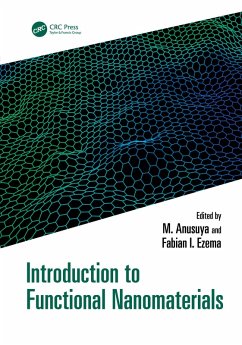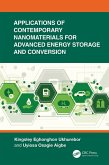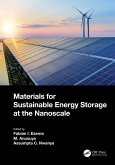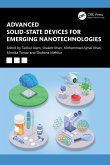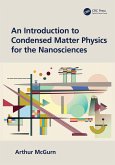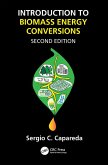Introduction to Functional Nanomaterials (eBook, ePUB)
Redaktion: Anusuya, M.; Ezema, Fabian I.


Alle Infos zum eBook verschenken

Introduction to Functional Nanomaterials (eBook, ePUB)
Redaktion: Anusuya, M.; Ezema, Fabian I.
- Format: ePub
- Merkliste
- Auf die Merkliste
- Bewerten Bewerten
- Teilen
- Produkt teilen
- Produkterinnerung
- Produkterinnerung

Hier können Sie sich einloggen

Bitte loggen Sie sich zunächst in Ihr Kundenkonto ein oder registrieren Sie sich bei bücher.de, um das eBook-Abo tolino select nutzen zu können.
This book provides a comprehensive review of nanomaterials, including essential foundational examples of nanosensors, smart nanomaterials, nanopolymers, and nanotubes. Chapters cover their synthesis and characteristics, production methods, and applications, with specific sections exploring nanoelectronics and electro-optic nanotechnology, nanostructures, and nanodevices. This book is a valuable resource for interdisciplinary researchers who want to learn more about the synthesis of nanomaterials and how they are used in different types of energy storage devices, including supercapacitors,…mehr
- Geräte: eReader
- mit Kopierschutz
- eBook Hilfe
- Größe: 29.88MB
![Applications of Contemporary Nanomaterials for Advanced Energy Storage and Conversion (eBook, ePUB) Applications of Contemporary Nanomaterials for Advanced Energy Storage and Conversion (eBook, ePUB)]() Kingsley Eghonghon UkhureborApplications of Contemporary Nanomaterials for Advanced Energy Storage and Conversion (eBook, ePUB)52,95 €
Kingsley Eghonghon UkhureborApplications of Contemporary Nanomaterials for Advanced Energy Storage and Conversion (eBook, ePUB)52,95 €![Materials for Sustainable Energy Storage at the Nanoscale (eBook, ePUB) Materials for Sustainable Energy Storage at the Nanoscale (eBook, ePUB)]() Materials for Sustainable Energy Storage at the Nanoscale (eBook, ePUB)45,95 €
Materials for Sustainable Energy Storage at the Nanoscale (eBook, ePUB)45,95 €![Spinel and Inverse Spinel Ferrites (eBook, ePUB) Spinel and Inverse Spinel Ferrites (eBook, ePUB)]() Spinel and Inverse Spinel Ferrites (eBook, ePUB)52,95 €
Spinel and Inverse Spinel Ferrites (eBook, ePUB)52,95 €![Advanced Solid-state Devices for Emerging Nanotechnologies (eBook, ePUB) Advanced Solid-state Devices for Emerging Nanotechnologies (eBook, ePUB)]() Advanced Solid-state Devices for Emerging Nanotechnologies (eBook, ePUB)48,95 €
Advanced Solid-state Devices for Emerging Nanotechnologies (eBook, ePUB)48,95 €![An Introduction to Condensed Matter Physics for the Nanosciences (eBook, ePUB) An Introduction to Condensed Matter Physics for the Nanosciences (eBook, ePUB)]() Arthur McGurnAn Introduction to Condensed Matter Physics for the Nanosciences (eBook, ePUB)45,95 €
Arthur McGurnAn Introduction to Condensed Matter Physics for the Nanosciences (eBook, ePUB)45,95 €![Introduction to Biomass Energy Conversions (eBook, ePUB) Introduction to Biomass Energy Conversions (eBook, ePUB)]() Sergio CaparedaIntroduction to Biomass Energy Conversions (eBook, ePUB)123,95 €
Sergio CaparedaIntroduction to Biomass Energy Conversions (eBook, ePUB)123,95 €![Variable Gain Control and Its Applications in Energy Conversion (eBook, ePUB) Variable Gain Control and Its Applications in Energy Conversion (eBook, ePUB)]() Chenghui ZhangVariable Gain Control and Its Applications in Energy Conversion (eBook, ePUB)69,95 €
Chenghui ZhangVariable Gain Control and Its Applications in Energy Conversion (eBook, ePUB)69,95 €-
-
-
Key Features:
- Comprehensive overview of how nanomaterials can be utilised in a variety of interdisciplinary applications
- Explores the fundamental theories, alongside their electrochemical mechanisms and computation
- Discusses recent developments in electrode designing based on nanomaterials, separators, and the fabrication of advanced devices and their performances
Dieser Download kann aus rechtlichen Gründen nur mit Rechnungsadresse in A, B, BG, CY, CZ, D, DK, EW, E, FIN, F, GR, HR, H, IRL, I, LT, L, LR, M, NL, PL, P, R, S, SLO, SK ausgeliefert werden.
- Produktdetails
- Verlag: Taylor & Francis eBooks
- Seitenzahl: 426
- Erscheinungstermin: 27. November 2024
- Englisch
- ISBN-13: 9781040121153
- Artikelnr.: 72294298
- Verlag: Taylor & Francis eBooks
- Seitenzahl: 426
- Erscheinungstermin: 27. November 2024
- Englisch
- ISBN-13: 9781040121153
- Artikelnr.: 72294298
- Herstellerkennzeichnung Die Herstellerinformationen sind derzeit nicht verfügbar.
Investigation of Crystalline Electron Conductors. Chapter 3: Advancements
in EMI Shielding Strategies and Innovations with a Focus on Energy Storage
Solutions. Chapter 4: Performance Evaluation and Statistical Analysis of
Green Materials for CO2 Reduction Using Fly Ash Mixture. Chapter 5: The
Evolution of Energy Storage Devices. Chapter 6: Exploring the
Self-Repairing Mechanisms in Polymer Composites for Stretchable and
Transparent Conductive Applications. Chapter 7: Deep Learning Empowered
Nanotechnology and Energy Storage for Sustainable Environmental
Preservation. Chapter 8: Anticancer Potential of Biofunctional Iron Oxide
Nanoparticles. Chapter 9: The Artificial Intelligence-Based Revolution in
Material Science for Advanced Energy Storage. Chapter 10: Nanoparticles in
Tissue Engineering Application and Regenerative Medicine. Chapter 11: The
Evolution of Materials through Machine Learning for Enhanced Energy Storage
Solutions. Chapter 12: Comprehensive Analysis of Photovoltaic Energy
Storage Device controller and Its Applications. Chapter 13: Exploring
Semiconductor Device Theory and Real-World Applications with a Focus on
Advancements in Energy Storage. Chapter 14: Functional Materials in
Cosmetic Nanotechnology. Chapter 15: Emerging Nanomaterials for Advanced
Technologies. Chapter 16: Determination of Kinetic Parameters and
Mechanical Properties of Nonlinear Optical Single Crystals. Chapter 17:
Nanotechnology Innovations in Biomedicine: Applications of Responsive
Nanomaterials. Chapter 18: Zirconium's Role in Advancing Electrochemical
Energy Storage Devices: A Comprehensive Review. Chapter 19: Nanocomposite
Materials for Biomedical and Energy Storage Devices. Chapter 20:
Therapeutic Capabilities of Advance Nanomaterials to Enhance the Diabetes
Mellitus Treatment. Chapter 21: Machine Learning Applications in Designing
Advanced Energy Storage Materials: A Comprehensive Exploration. Chapter 22:
Sustainable Solutions on the Horizon: A Critical Review on Bioplastics as
Key Materials in Modern Food Science. Chapter 23: Review on Performance
Comparison of Contemporary Multi-level Inverter Structures for Energy
Storage Applications. Chapter 24: Direction of Energy Storage Failure in
Mechanical Industries Using Machine Learning. Chapter 25: Research Tendency
Route to Extremely Efficient and Stable Dye-Sensitized Solar Cell
Applications. Chapter 26: An Outlook of Organic Photosensitizer for Highly
Efficient Dye Sensitized Solar Cell Applications. Chapter 27: Study on
Behaviour of Sustainable Green Building Materials in Conoidal Shell
Structure. Chapter 28: Strategic and Systematic Approach of Nanomaterials
as well as Simulation Studies to Enhance Cancer Therapy. Chapter 29: Role
of Nanomaterials in Food Packaging Applications. Chapter 30: Development of
Smart Textiles Using Functional Nanofibres for Wearable Technology. Chapter
31: Novel Energy Harvesting Systems for Nanorobots. Chapter 32: Aerodynamic
Shape Memory Alloy-based Actuators for Robotics Applications. Chapter 33:
Functional Materials for Energy Conversion and Storage. Chapter 34:
Exploring Perovskite Solar Cells for Enhanced Photovoltaic Performance.
Chapter 35: Nanofunctional Materials in Food Processing. Chapter 36: Design
and Optimization of Flexible Electronics Using Organic Semiconductors.
Chapter 37: Nanofunctional Materials in Food Processing. Chapter 38:
Application Studies: Synthesis, Charactersation, Antimicrobial Activity of
LSNN Crystal. Chapter 39: Analysing Wave Propagation Characteristics in
Fluid-Conveying Magneto-Thermo-Elastic Zigzag Carbon Nanotubes Subjected to
Harmonic Excitation. Chapter 40: Nano Processing and Preservation in Foods.
Investigation of Crystalline Electron Conductors. Chapter 3: Advancements
in EMI Shielding Strategies and Innovations with a Focus on Energy Storage
Solutions. Chapter 4: Performance Evaluation and Statistical Analysis of
Green Materials for CO2 Reduction Using Fly Ash Mixture. Chapter 5: The
Evolution of Energy Storage Devices. Chapter 6: Exploring the
Self-Repairing Mechanisms in Polymer Composites for Stretchable and
Transparent Conductive Applications. Chapter 7: Deep Learning Empowered
Nanotechnology and Energy Storage for Sustainable Environmental
Preservation. Chapter 8: Anticancer Potential of Biofunctional Iron Oxide
Nanoparticles. Chapter 9: The Artificial Intelligence-Based Revolution in
Material Science for Advanced Energy Storage. Chapter 10: Nanoparticles in
Tissue Engineering Application and Regenerative Medicine. Chapter 11: The
Evolution of Materials through Machine Learning for Enhanced Energy Storage
Solutions. Chapter 12: Comprehensive Analysis of Photovoltaic Energy
Storage Device controller and Its Applications. Chapter 13: Exploring
Semiconductor Device Theory and Real-World Applications with a Focus on
Advancements in Energy Storage. Chapter 14: Functional Materials in
Cosmetic Nanotechnology. Chapter 15: Emerging Nanomaterials for Advanced
Technologies. Chapter 16: Determination of Kinetic Parameters and
Mechanical Properties of Nonlinear Optical Single Crystals. Chapter 17:
Nanotechnology Innovations in Biomedicine: Applications of Responsive
Nanomaterials. Chapter 18: Zirconium's Role in Advancing Electrochemical
Energy Storage Devices: A Comprehensive Review. Chapter 19: Nanocomposite
Materials for Biomedical and Energy Storage Devices. Chapter 20:
Therapeutic Capabilities of Advance Nanomaterials to Enhance the Diabetes
Mellitus Treatment. Chapter 21: Machine Learning Applications in Designing
Advanced Energy Storage Materials: A Comprehensive Exploration. Chapter 22:
Sustainable Solutions on the Horizon: A Critical Review on Bioplastics as
Key Materials in Modern Food Science. Chapter 23: Review on Performance
Comparison of Contemporary Multi-level Inverter Structures for Energy
Storage Applications. Chapter 24: Direction of Energy Storage Failure in
Mechanical Industries Using Machine Learning. Chapter 25: Research Tendency
Route to Extremely Efficient and Stable Dye-Sensitized Solar Cell
Applications. Chapter 26: An Outlook of Organic Photosensitizer for Highly
Efficient Dye Sensitized Solar Cell Applications. Chapter 27: Study on
Behaviour of Sustainable Green Building Materials in Conoidal Shell
Structure. Chapter 28: Strategic and Systematic Approach of Nanomaterials
as well as Simulation Studies to Enhance Cancer Therapy. Chapter 29: Role
of Nanomaterials in Food Packaging Applications. Chapter 30: Development of
Smart Textiles Using Functional Nanofibres for Wearable Technology. Chapter
31: Novel Energy Harvesting Systems for Nanorobots. Chapter 32: Aerodynamic
Shape Memory Alloy-based Actuators for Robotics Applications. Chapter 33:
Functional Materials for Energy Conversion and Storage. Chapter 34:
Exploring Perovskite Solar Cells for Enhanced Photovoltaic Performance.
Chapter 35: Nanofunctional Materials in Food Processing. Chapter 36: Design
and Optimization of Flexible Electronics Using Organic Semiconductors.
Chapter 37: Nanofunctional Materials in Food Processing. Chapter 38:
Application Studies: Synthesis, Charactersation, Antimicrobial Activity of
LSNN Crystal. Chapter 39: Analysing Wave Propagation Characteristics in
Fluid-Conveying Magneto-Thermo-Elastic Zigzag Carbon Nanotubes Subjected to
Harmonic Excitation. Chapter 40: Nano Processing and Preservation in Foods.
